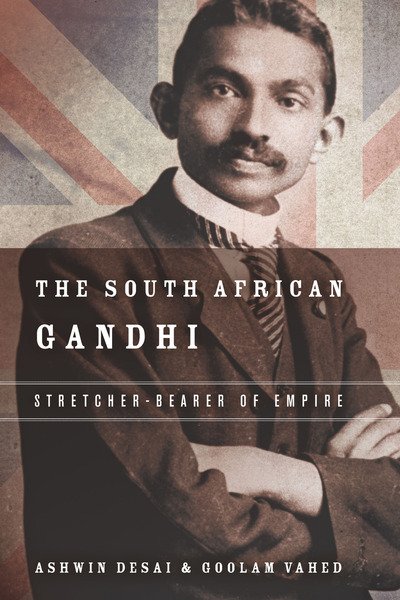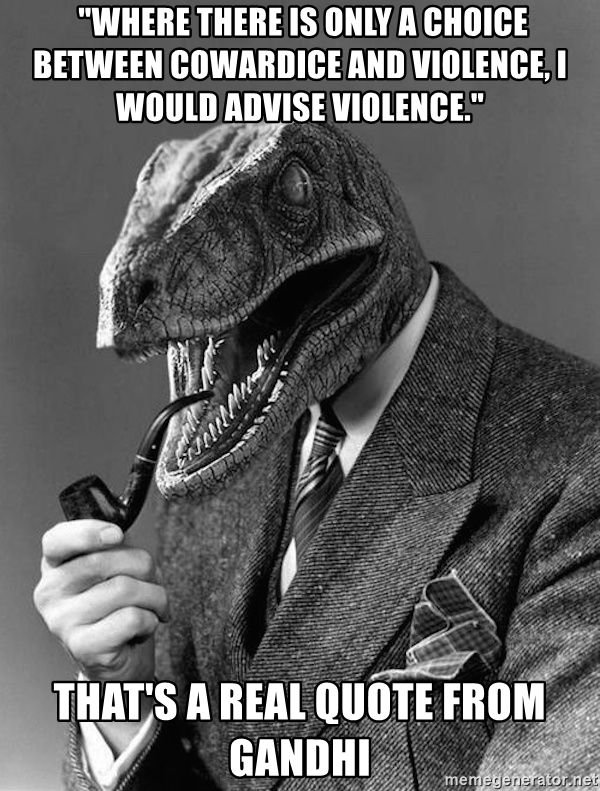A Collection of mind blowing facts including how Gandhi served the British Army, advocated war, acted racist and how Everest isn't the tallest Mountain on Earth when measured from the center of Earth
You may think you know a lot about the world. You may even think you are well educated and you may even consider some things to be impossible. I've loved "facts" ever since I was a kid. Have you ever tried those books that are collections of facts. I loved to read those and memorize as much as I can. Some of them got outdated with time. But it was fun knowing them. It was actually more fun to know the chronology of the history of certain facts. So I thought of sharing a bunch of great facts with you guys.
The next one might be surprising to many. It's all thanks to people spreading selected information about specific people and events. The meme was actually created by me
I don't have a problem with the quote itself. It's just the image that is built about Gandhi as if he is the personification of "Turn the other cheek". During his life, Gandhi vocally supported every major war, including the Second Boer War, the Bambatha Uprising, World War I, World War II, and India’s military annexation of Kashmir, Hyderabad, and Junagarh. He served as a volunteer in the colonial British Army in the first two conflicts. Most of these information can be found just by looking at his Wikipedia page. For an example, Gandhi was a racist.
Gandhi complained the whites in British colony of South Africa were degrading Indian Hindus and Muslims to "a level of Kaffir". When reading "Kaffir", think something along the lines of "nigger". According to Wikipedia Gandhi, at age 24, prepared a legal brief for the Natal Assembly in 1895, seeking voting rights for Indians. Gandhi cited race history and European Orientalists' opinions that "Anglo-Saxons and Indians are sprung from the same Aryan stock or rather the Indo-European peoples", and argued that Indians should not be grouped with the Africans. Gandhi actually fought against Boer settlers in South Africa (He volunteered to serve in the British Army). He stated that "when the war was declared, my personal sympathies were all with the Boers, but my loyalty to the British rule drove me to participation with the British in that war"
Gandhi not only supported pretty much every war he had to face in his lifetime, he marched thousands of young people into their bloody deaths in non-violent protests because the British weren't being non-violent while Gandhi told his followers not to fight back even though he himself had volunteered to fight for the British Empire.
"To bring about such a state of things we should have the ability to defend ourselves, that is, the ability to bear arms and to use them...If we want to learn the use of arms with the greatest possible despatch, it is our duty to enlist ourselves in the army."
-Gandhi
But a personal letter to John Maffey, 1st Baron Rugby Gandhi wrote that he "personally will not kill or injure anybody, friend or foe." Even if this isn't hypocrisy, it is at least an inconsistent mess. According to Nelson Mandela; the general image of Gandhi, state Desai and Vahed, has been reinvented since his assassination as if he was always a saint, when in reality his life was more complex, contained inconvenient truths and was one that evolved over time.
The South African Gandhi: Stretcher-Bearer of Empire

The book is published by Stanford University Press and it is The Winner of the 2016 Choice Award for Outstanding Academic Title, sponsored by the American Library Association. It's a 344 page book and the first chapter is available for free at http://www.sup.org/books/extra/?id=26014&i=Chapter%201.html Following is the description of the book.
In the pantheon of freedom fighters, Mohandas Karamchand Gandhi has pride of place. His fame and influence extend far beyond India and are nowhere more significant than in South Africa. "India gave us a Mohandas, we gave them a Mahatma," goes a popular South African refrain. Contemporary South African leaders, including Mandela, have consistently lauded him as being part of the epic battle to defeat the racist white regime.
The South African Gandhi focuses on Gandhi's first leadership experiences and the complicated man they reveal—a man who actually supported the British Empire. Ashwin Desai and Goolam Vahed unveil a man who, throughout his stay on African soil, stayed true to Empire while showing a disdain for Africans. For Gandhi, whites and Indians were bonded by an Aryan bloodline that had no place for the African. Gandhi's racism was matched by his class prejudice towards the Indian indentured. He persistently claimed that they were ignorant and needed his leadership, and he wrote their resistances and compromises in surviving a brutal labor regime out of history. The South African Gandhi writes the indentured and working class back into history.
The authors show that Gandhi never missed an opportunity to show his loyalty to Empire, with a particular penchant for war as a means to do so. He served as an Empire stretcher-bearer in the Boer War while the British occupied South Africa, he demanded guns in the aftermath of the Bhambatha Rebellion, and he toured the villages of India during the First World War as recruiter for the Imperial army. This meticulously researched book punctures the dominant narrative of Gandhi and uncovers an ambiguous figure whose time on African soil was marked by a desire to seek the integration of Indians, minus many basic rights, into the white body politic while simultaneously excluding Africans from his moral compass and political ideals.
Don't just follow the stereotypes you know. Mk Ultra was only known decades after everything went down. American Citizens were used as lab rats and even to this date nobody has been punished. The same thing went down with Snowden. Even to this date most schools inaccurately teach that matter only has 3 forms Solid, Liquid, Gas. But the 4th state Plasma may be the most abundant form of ordinary matter in the universe. So never stop looking for facts. They might end up forever changing the way you look at the world and what's in it.



I have always been interested in curious facts. In fact, a few months ago I created several publications about it, although they only talked about the Second World War.
With respect to Gandhi, we should not trust what Wikipedia says, it is not a reliable source, I don't think it is a good person or bad person, but it is definitely not as they show it. When we study history we tend to forget about several things. The first is the context, as was the way of thinking, the common, at that time. And the second, people change, a person can say something young, and then when they are in their old age they have a mentality very different from everything.
I have spoken many times about the distortion of history, especially in characters that are quite critical by postmodernism, such as Christopher Columbus, Simón Bolívar, etc.
With that clarified, I think that Gandhi probably evolved a lot in his story, I'm not an expert about it, but probably reached his stage as an old-age pacifist, perhaps between the years of 1920-30, I would not be surprised if before that it was a racist, it was very likely that someone at that time was.
He even had ties with Mussolini, who financed it for some time, and even came to write a letter to Hitler, although this would not show at all that had links with the latter. However, he saw the British Empire as an enemy and could try to negotiate with anyone to seek the independence of India.
Maybe he has a darker past than we think, although we also have to see the two sides of the coin, I don't think, as I said before, he was the best of men, but I don't think he was among the worst, it was a political and sought their personal and national interests as such.
Above is one of the best quotes I've seen that describe Gandhi. I didn't add everything I found as it would have made the whole post look messy. I first got to know Gandhi a little less than 15 years ago. So far I've found 3 things that define Gandhi.
The odd thing is that the closest political figure that show a similar syntax to Gandhi is Donald Trump. Mohandas became Gandhi out of necessity and as a means to an end. I wouldn't trust Wikipedia on its own. I checked many other sources too and they add up. Gandhi wasn't even awarded the Nobel Peace price because of his support towards wars. At one point he was even writing propaganda for The British Troops.
If you start looking at Gandhi as a political pragmatist, most of the complexity just fades away. I'm not Gandhi and I have no crystal ball. But Occam's Razor is a significantly reliable tool and I haven't found any factual holes in my Gandhi is a different flavor of Trump just as Wolf Warrior is a different flavor of Rambo.
"Great men are almost always bad men, even when they exercise influence and not authority…”
A fitting quote indeed , Appearing as a saint and doing questionable things behind the curtains
Although the quote fit the occasion, I don't think Gandhi was masquerading as a saint. He was just going with whatever he thought of as the best path to an end. See my response to @vieira
one thing was for sure he was a patriot
That's true.
Resteemed upvoted